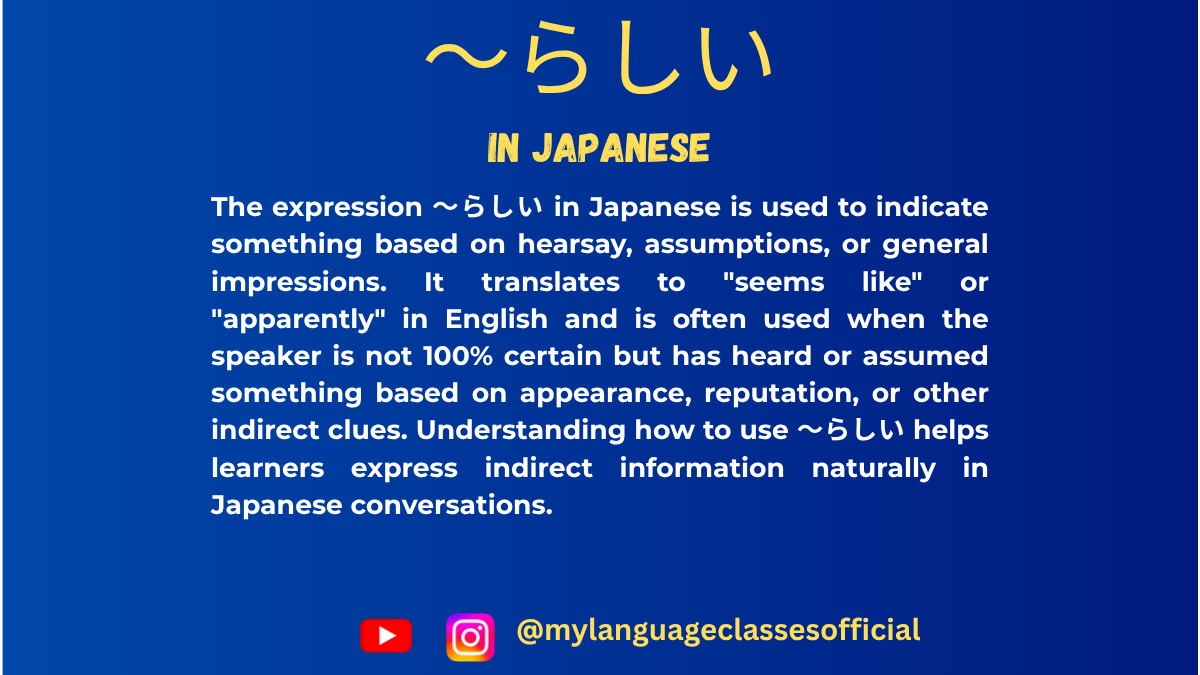Your cart is currently empty!
Tag: Japanese assumptions
-

Understanding 〜らしい in Japanese | My Language Classes
Understanding 〜らしい in Japanese
When learning Japanese, one of the essential expressions to understand is 〜らしい. This suffix plays a vital role in expressing assumptions, hearsay, characteristics, and appropriateness. In this blog post, we will explore all possible usages of 〜らしい, providing clear explanations and examples.
1. Expressing Hearsay or Second-hand Information
One of the most common uses of 〜らしい is to indicate information that the speaker has heard from someone else but has not personally verified.
Structure:
Verb (Plain Form) + らしい
い-adjective (Plain Form) + らしい
な-adjective + らしい
Noun + らしいExamples:
- そのレストランは美味しいらしいよ。
(I heard that restaurant is delicious.) - たろうは今日休むらしい。
(I heard that Tarou is taking the day off today.) - この映画はめちゃくちゃ面白いらしい。
(I heard that this movie is really interesting.)
Usage Note:
Compared to そうだ, which is also used for hearsay, らしい implies that the information is based on indirect sources rather than direct observation.
2. Expressing Assumptions or Inferences
Another way to use 〜らしい is when making an assumption based on evidence.
Examples:
- たくさんの人が黒い服を着ている。 お蔵式があったらしい。
(Many people are wearing black clothes. It looks like there was a funeral.) - あの子はプロ野球選手の子どもらしい。
(That child seems to be the son of a professional baseball player.)
Usage Note:
This is different from ようだ, which is used for assumptions based on visual evidence, whereas らしい is based on reasoning or known facts.
3. Expressing Typical Characteristics
〜らしい can also be used to describe something that has the typical characteristics of a person, thing, or behavior.
Examples:
- このラーメンは日本らしい味だね。
(This ramen has a very “Japanese” flavor.) - かれは仕事に小さいことまで注意を払う。真面目らしい人だ。
(He pays attention to small details in his work. He is a serious person.) - 她はいつも元気で、すごく子どもらしい。
(She is always energetic, very much like a child.)
Usage Note:
This usage expresses the “essence” of something or someone. It is similar to みたい but is more about inherent qualities rather than just resemblance.
4. Expressing Suitability or Appropriateness
In some cases, 〜らしい can be used to indicate something that fits a certain expectation or role.
Examples:
- 日本らしいけしきゃんの誕生日プレゼントを買いたい。
(I want to buy a birthday present that is “Japanese-like”.) - 少年らしい仕事を求めている。
(Looking for work suitable for young people.)
Usage Note:
This is closely related to the “typical characteristics” meaning but emphasizes suitability rather than mere resemblance.
Situations Where 〜らしい is Used
Below is a list of common situations where 〜らしい is applicable:
- Hearsay – When conveying information heard from others.
- Inference – When making an assumption based on indirect evidence.
- Typical Characteristics – When describing something as having the essence of a person, thing, or behavior.
- Suitability – When expressing something as being appropriate for a certain role or image.
- Rumors – When talking about unverified rumors or gossip.
Final Thoughts
Mastering 〜らしい is essential for expressing assumptions, typicality, and hearsay in Japanese. While it might seem tricky at first, practicing with real-life examples and distinguishing it from similar expressions like そうだ and ようだ will help you use it naturally.
By understanding these nuances, you’ll be able to sound more fluent and natural in your Japanese conversations. Keep practicing, and don’t hesitate to use 〜らしい in different situations!
If you enjoyed this lesson, be sure to check out more posts like this on my blog at My Language Classes. Don’t forget to subscribe my YouTube channel and follow me on Instagram for the latest language learning tips and lessons. Leave a comment below to share your thoughts, or ask any questions you have about nouns.
Happy learning! 😊
- そのレストランは美味しいらしいよ。
